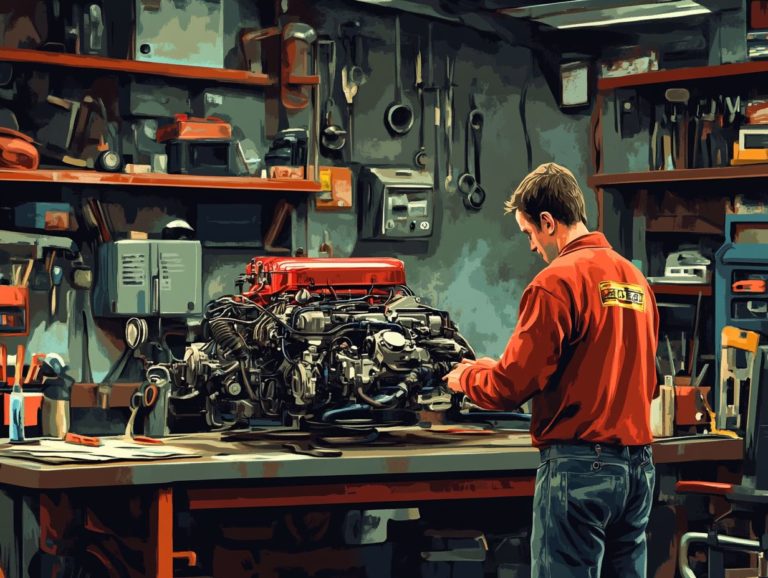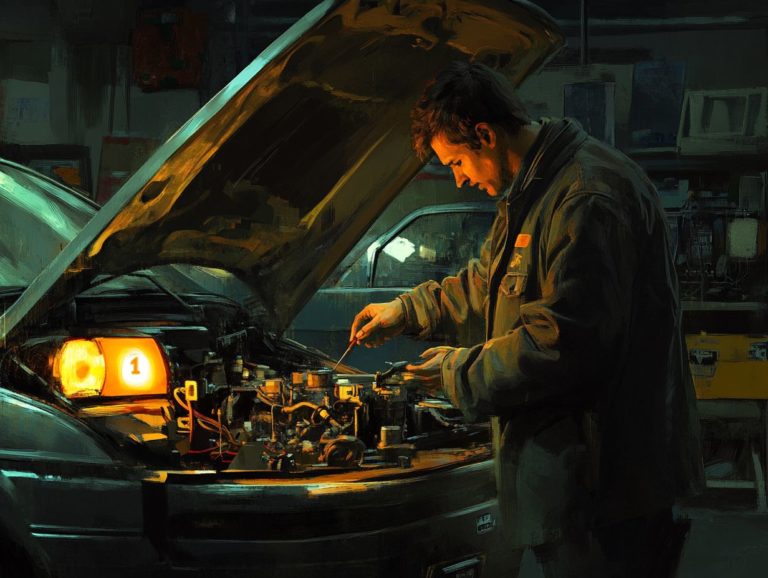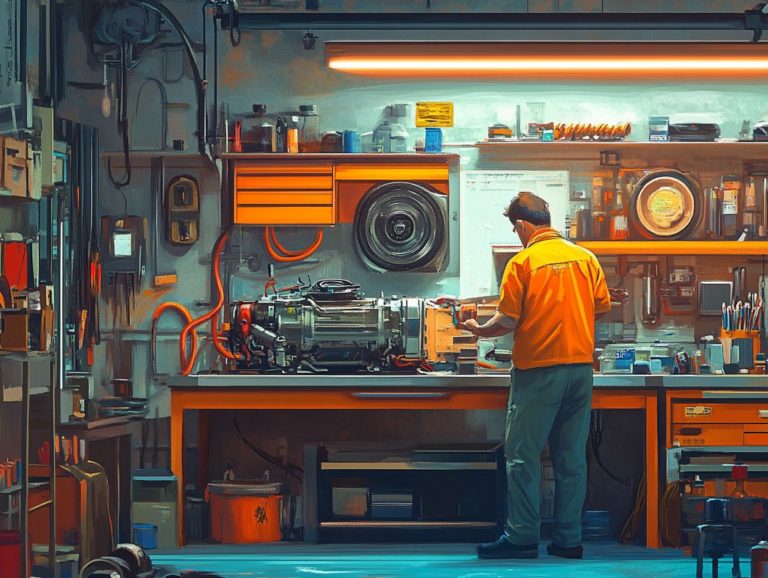5 Tips for Avoiding Common Car Repairs
Maintaining your vehicle goes beyond just ensuring it runs smoothly; it can also save you valuable time and money over the long haul.
Here are five vital tips you can’t afford to miss! From consistently checking fluid levels to understanding how your driving habits cause wear and tear, these insights will prove invaluable.
Sticking to a maintenance schedule makes a big difference. Recognizing warning signs before they escalate into costly issues can truly have a significant impact.
Learn how to keep your car running like new don t wait!
Contents
- Key Takeaways:
- 1. Regularly Check and Maintain Fluid Levels
- 2. Keep Tires Properly Inflated and Rotated
- 3. Follow Recommended Maintenance Schedule
- 4. Practice Good Driving Habits
- 5. Address Any Issues Immediately
- What Are the Most Common Car Repairs and How to Avoid Them?
- Frequently Asked Questions
- What are some common car repairs that can be avoided?
- What are 5 tips for avoiding these common car repairs?
- How can I maintain my car’s tires to prevent flat tires?
- What should I do if my car’s battery dies frequently?
- Is it important to follow my car’s recommended maintenance schedule?
- How can I prevent my car’s transmission from having issues?
Key Takeaways:
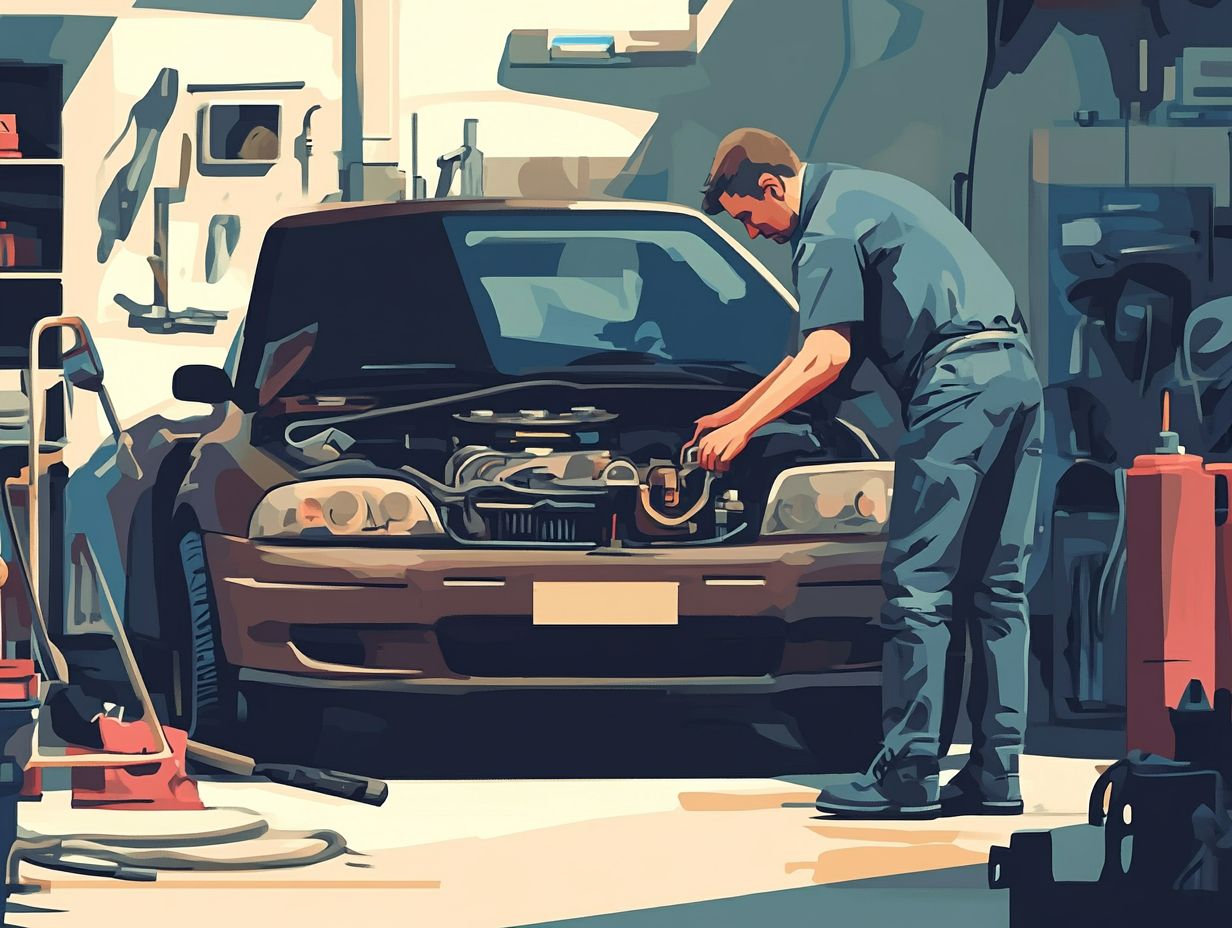
- Regularly checking and maintaining fluid levels can save you money on repairs.
- Properly inflated and rotated tires improve fuel efficiency and prevent wear and tear.
- Following a recommended maintenance schedule extends the lifespan of your car.
1. Regularly Check and Maintain Fluid Levels
Regularly checking and maintaining the fluid levels in your car is essential for ensuring the best performance and long life. This means not just keeping an eye on the engine coolant and oil levels but also checking brake fluid, power steering fluid, and ensuring the radiator is functioning properly to avoid overheating, which can cause expensive repairs.
Don t forget to top off your windshield washer fluid regularly for clear visibility, especially during bad weather. Performing these checks is straightforward: simply pop the hood and use a dipstick, a tool used to measure oil levels, while coolant and other fluids typically come in transparent reservoirs with handy minimum and maximum markings.
Neglecting these essential fluids can lead to a range of issues, such as:
- Brake system malfunction due to low brake fluid
- Steering difficulties from insufficient power steering fluid
- Severe engine damage resulting from low coolant or oil levels
By dedicating just a few minutes each month to these checks, you can significantly enhance your vehicle’s reliability, performance, and longevity.
2. Keep Tires Properly Inflated and Rotated
Maintaining proper tire pressure and adhering to a regular tire rotation schedule are essential components of vehicle maintenance that significantly enhance performance, safety, and fuel efficiency.
Proper tire pressure is critical to how your vehicle handles on the road, influencing everything from braking distance to cornering stability. When tires are under-inflated, they can increase rolling resistance, leading to a noticeable dip in fuel economy. Conversely, over-inflated tires risk uneven wear, which can be problematic. To ensure a smoother driving experience and bolster your safety, it’s wise to check your tire pressure monthly and before embarking on long trips.
Rotating your tires every 5,000 to 7,500 miles can effectively prevent uneven wear and extend the lifespan of your tires. This proactive approach not only saves you money but also enhances your vehicle s overall responsiveness, making every drive a pleasure.
3. Follow Recommended Maintenance Schedule
Following a recommended maintenance schedule is crucial for ensuring your vehicle performs at its best. It can significantly extend your car’s lifespan and help you avoid those costly repairs that seem to pop up when you least expect them. Regular tasks such as replacing brake pads, changing oil filters, and checking spark plugs are not just box-ticking exercises; they play a vital role in your engine and braking system’s overall health.
Incorporating routine inspections for tire tread depth and fluid levels is essential, as is examining belts and hoses for signs of wear. These checks should be fundamental to your vehicle care plan. Typically, manufacturers recommend oil changes every 5,000 to 7,500 miles, depending on the type of oil you use, while other components might need your attention every six months.
By adhering to these schedules, you’re not only protecting your investment but also enhancing your safety on the road. Staying on top of these tasks and consulting your vehicle’s manual for specific guidelines can prevent minor issues from ballooning into significant problems, ensuring a smoother ride and granting you that well-deserved peace of mind as you drive.
4. Practice Good Driving Habits

Practicing good driving habits not only enhances your safety on the road but also significantly contributes to the longevity and reliability of your vehicle. This approach helps you avoid costly repairs and ensures that essential systems, like the suspension and headlights remain in excellent working condition.
Consider smooth acceleration and deceleration. These simple actions can dramatically reduce stress on your engine and transmission.
Maintaining safe speeds helps prevent unnecessary strain on your brakes and tires. Using your headlights appropriately, especially in adverse weather, improves visibility and keeps you safe.
By adopting these mindful practices, you re contributing to a healthier vehicle, minimizing the risk of breakdowns, and extending the life of crucial parts. Ultimately, this fosters a more reliable and cost-effective driving experience.
5. Address Any Issues Immediately
Addressing issues promptly is crucial in car maintenance; ignoring warning signs can lead to serious problems and costly repairs later on. Whether you’re checking for corrosion on the battery or inspecting your headlights, following the top 10 car maintenance tips for longevity can help you fix problems quickly and save you money and stress later.
Stay alert for any unusual sounds, like grinding or squeaking, as these may signal brake wear or mechanical failure. Watch the warning lights on your dashboard; these indicators give you important information about possible problems.
Fluid leaks, such as oil or coolant, need immediate attention. They can harm your vehicle’s performance. If any of these signals come up, your first response should be: check fluid levels or tighten any loose components.
If you’re unsure, consult a professional mechanic for a thorough inspection. Regular maintenance checks are essential for ensuring your vehicle operates smoothly and efficiently.
What Are the Most Common Car Repairs and How to Avoid Them?
Understanding the most common car repairs and knowing how to avoid them can save you significant costs and time. Engaging in routine practices like conducting thorough brake system inspections, monitoring your battery’s health, and maintaining the coolant system are crucial steps. Additionally, following tips for maintaining older vehicles can help prevent frequent issues such as brake problems and engine overheating.
Don’t skip regular oil changes and tire rotations; they’re crucial for your car’s health! For example, worn-out brake pads can lead to more severe damage, like the need for rotor replacements, which can escalate your repair costs. To avoid surprises, it’s important to be aware of the top 10 most common car repairs. A weak battery can leave you stranded, underscoring the necessity of regular testing and cleaning of battery terminals.
By adopting proactive maintenance habits and scheduling seasonal inspections, you can keep your car operating efficiently while significantly reducing the likelihood of encountering quick common car repairs.
What Are the Benefits of Regular Maintenance?
Regular maintenance brings many benefits that you shouldn’t miss, including lower auto repair costs, increased vehicle lifespan, and enhanced safety on the road. By embracing regular maintenance steps, you can identify potential issues before they spiral out of control, ensuring your car operates at peak performance.
Industry studies suggest that regular upkeep can decrease the chances of major repairs by up to 50%, translating into significant savings for you over time. For example, knowing how to handle common winter car repairs can help you avoid costly issues. Properly maintaining your vehicle can also enhance fuel efficiency, leading to further reductions in gas expenses.
Many automotive experts emphasize that consistent care not only extends your vehicle’s life but also dramatically improves safety; well-maintained brakes and tires can be the difference between a smooth ride and an accident.
Car owners often share how investing a little time and money pays off big. This not only grants you long-term peace of mind but also offers a financial advantage that pays off in the long run.
How Can Proper Tire Maintenance Save Money on Repairs?
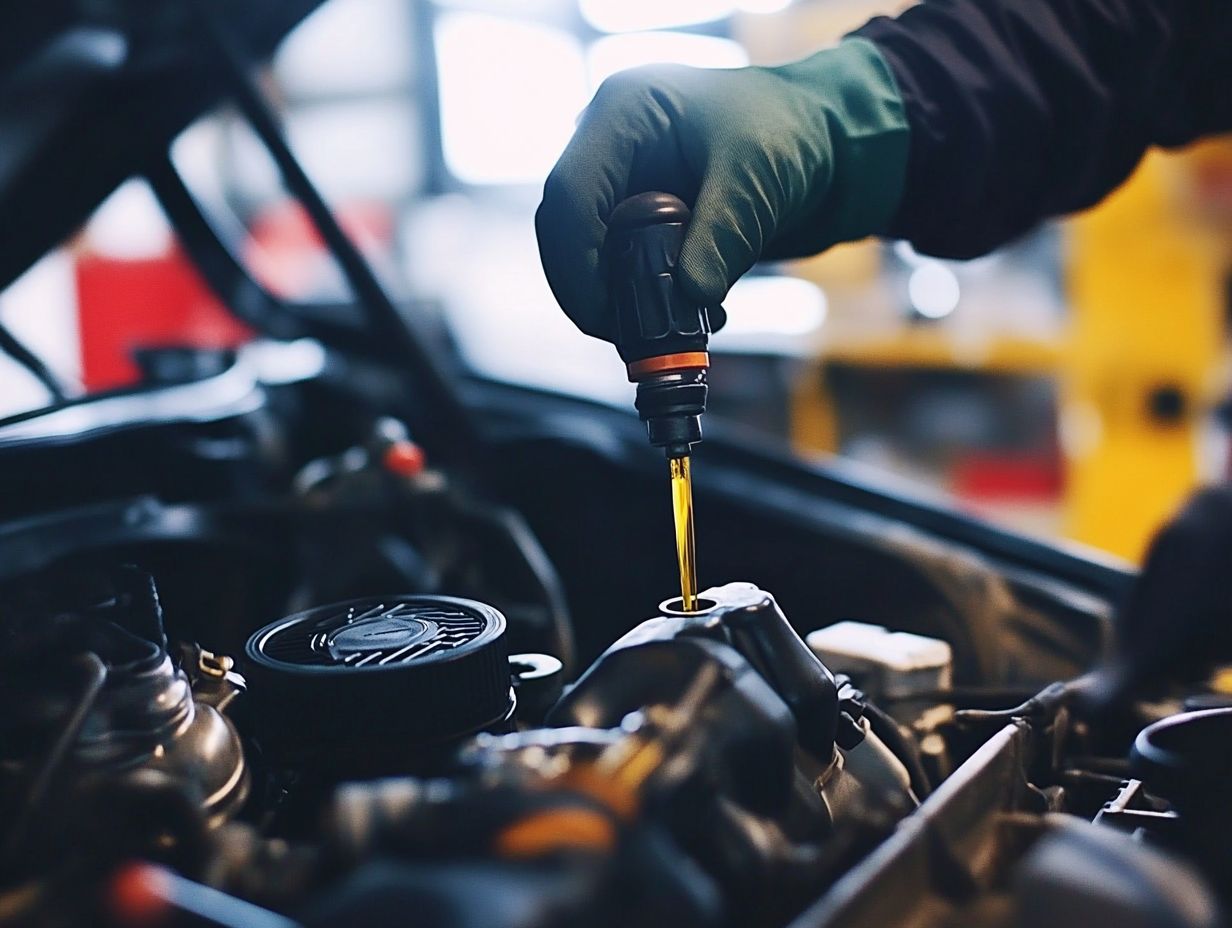
Proper tire maintenance is an often-overlooked aspect that can lead to substantial savings on repairs. It primarily prevents issues related to tire wear and enhances fuel efficiency.
By regularly checking and maintaining the correct tire pressure, you can significantly extend the lifespan of your tires, reducing the risk of early tire damage. Following a systematic tire rotation schedule moving tires from one position to another to ensure even wear ensures even distribution of tread wear across all tires, further enhancing their durability.
These practices not only promote safety on the road but also reduce the likelihood of incurring costly repairs associated with suspension system and alignment problems. For effective tire health checks, you should utilize a tire pressure gauge to confirm that each tire is inflated to the manufacturer s recommended levels. Additionally, visually inspecting them for signs of uneven wear or damage enables you to intervene promptly should any issues arise.
What Are the Key Components to a Recommended Maintenance Schedule?
A well-structured maintenance schedule for your vehicle should incorporate essential components like regular checks of belts and hoses, replacing the cabin air filter, and monitoring the suspension system. This ensures that all critical parts are functioning as they should.
Beyond these foundational tasks, a comprehensive schedule also includes routine inspections of fluid levels like engine oil, coolant, and brake fluid to optimize performance and prevent costly breakdowns. Don t overlook the importance of tire rotations and alignments; these practices promote even tire wear and enhance your safety and fuel efficiency.
Typically, these checks and replacements should be performed at specific intervals, usually every 5,000 to 10,000 miles, based on the manufacturer s recommendations. Sticking to this schedule significantly contributes to your vehicle s longevity and reliability, leading to a smoother driving experience and minimizing the risk of unexpected repairs.
How Do Driving Habits Affect Car Repairs?
Your driving habits play a crucial role in determining how often your car needs repairs. Aggressive driving can contribute to premature wear on essential components like brakes, tires, and the suspension system. It s vital for you to adopt habits that promote the longevity of your vehicle.
How you accelerate and brake can create unnecessary strain on vital parts of your car. For instance, sudden acceleration and frequent hard braking can lead to excessive tire wear and damage brake pads and rotors faster than you might expect. Consistently driving at high speeds can escalate these issues, resulting in complications that come with a hefty repair bill.
To avoid these problems, focus on smooth acceleration and deceleration, maintain a safe following distance, and stick to speed limits. Implementing these practices can significantly extend the lifespan of your vehicle and help you manage common car repairs on a budget.
What Are the Warning Signs of Potential Car Issues?
Recognizing the warning signs of potential car issues is vital for timely intervention. This proactive approach not only helps you avoid costly repairs but also ensures a safe driving experience. Additionally, learning how to prevent common brake repairs can be particularly beneficial. Look out for common signs such as unusual noises, fluid leaks, or dashboard warning lights; each of these merits your immediate attention.
For instance, if you hear a grinding sound when braking, it could signal worn brake pads, making it essential to monitor your braking performance closely. Dark puddles forming under your vehicle might point to oil or coolant leaks, which you should address promptly to prevent engine overheating.
Be vigilant about the check engine light. Ignoring it can lead to significant engine problems down the road. When you notice one of these warning signs, it s wise to consult a mechanic as soon as possible, especially if the symptoms worsen or if you’re uncertain about your vehicle’s condition.
Frequently Asked Questions
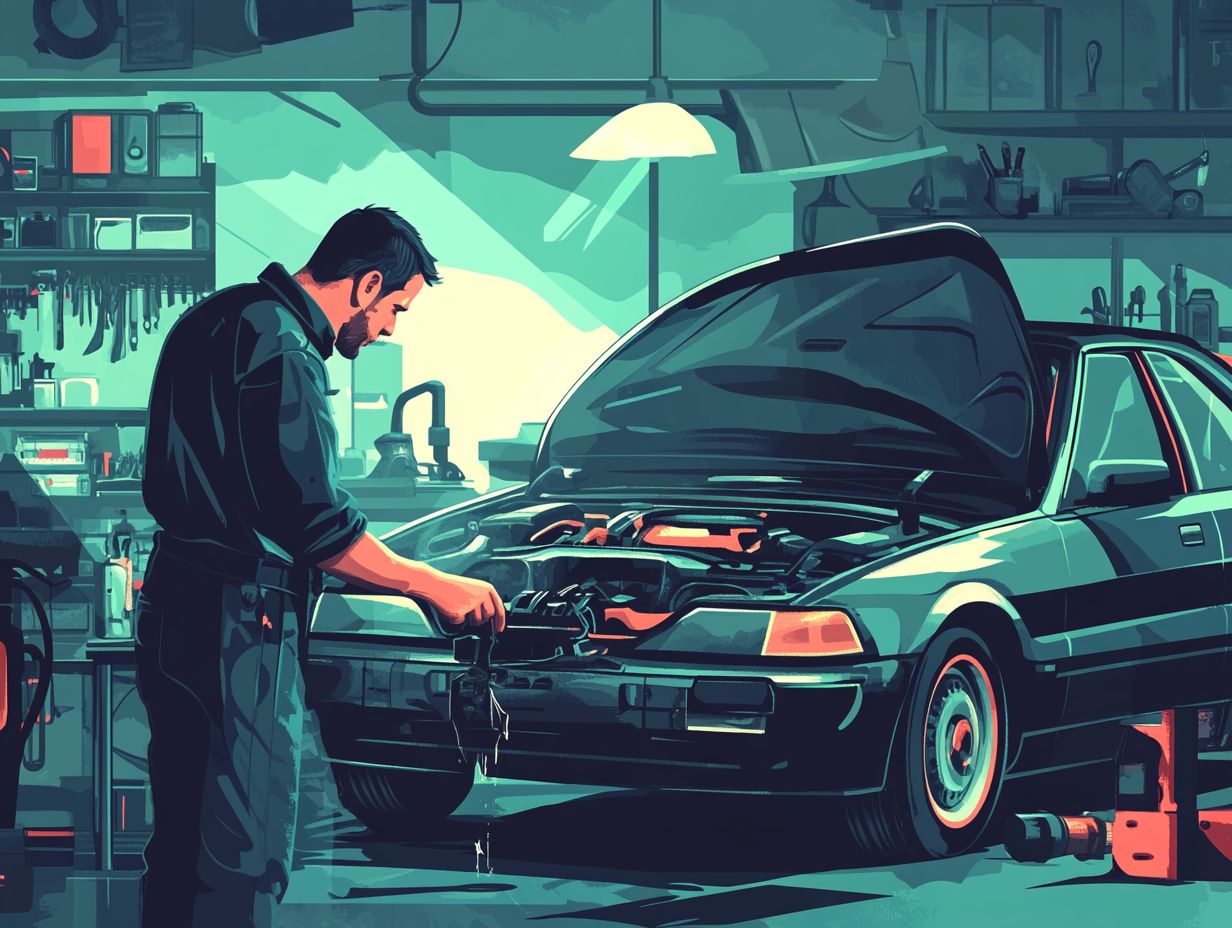
Check your tires now to save money and ensure safety!
What are some common car repairs that can be avoided?
Common car repairs that can be avoided include flat tires, dead batteries, engine overheating, brake system failures, and transmission issues.
What are 5 tips for avoiding these common car repairs?
- Regularly check and maintain your tire pressure to prevent flat tires.
- Keep your battery clean and free of corrosion to avoid it dying.
- Follow your car’s maintenance schedule to prevent engine overheating.
- Get your brake system inspected and serviced regularly to avoid failure.
- Use your car’s gears and brakes properly to prevent issues.
How can I maintain my car’s tires to prevent flat tires?
To maintain your car’s tires, check the pressure regularly. Keep them inflated to the recommended level. Rotate your tires and balance and align them regularly to ensure even wear and prevent flats.
What should I do if my car’s battery dies frequently?
If your car’s battery dies often, first check for corrosion and clean it if needed. If the problem persists, have a professional mechanic check your battery and charging system.
Is it important to follow my car’s recommended maintenance schedule?
Absolutely! Following your car’s maintenance schedule keeps it in top shape. This schedule helps your car run smoothly and catch problems early.
How can I prevent my car’s transmission from having issues?
To prevent transmission issues, use your car’s gears and brakes correctly. Avoid sudden stops and starts. Don’t shift between gears while the car is moving. Also, check and change your transmission fluid when necessary.


